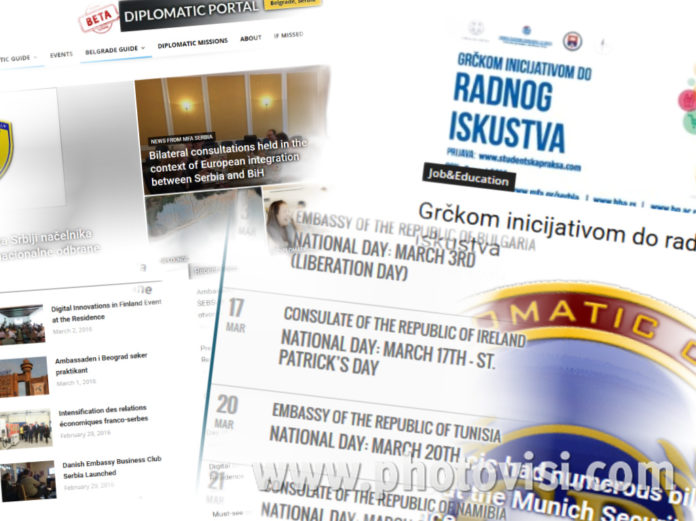“A Journey To The Future”
By Miša Dragin, editor of Kikindske.
Original article in Serbian: http://bit.ly/1RnUhB9
As it usually happens, while Kikindske were going through the toughest days in their eighteen-year-old history, that is, during the period where we did not print the newspapers, there came an invitation from the Royal Danish Embassy and the Foundation Slavko Curuvija with the request that someone from our newsroom visits the leading media outlet in Denmark- JP/ Politiken Hus. For some reasons, which will stay a small editorial secret, the choice has come down to me, technical editor of Kikindske and an author of this article.
The visit lasted for five days and besides the capital of Denmark, Copenhagen, where we spent two days, we also spent the last three days in Aarhus, second largest city in Denmark. The team which consisted of Vitomir Ognjanovic, one of the founders and the director of the regional portal “Juzne vesti” from Nis, and Dejan Miladinovic, owner and chief editor of the paper “List” from Kragujevac, was led by Ilir Gasi from Slavko Curuvija Foundation.
The aim of this trip was to get familiar with the ways of doing business within Danish newspapers and to understand their struggle with the global trend of reducing printed editions and switching to internet publications. Presented business models are, of course, not something that we could just copy in Serbia, but it is certain that we could use these experiences in the future when/if media business here becomes less dependent on the political happenings and more on the market ones. As for the fight for the readers who do not want to make their hands dirty with printer´s ink, we had a chance to hear and see some different ways which will be of great use for Kikindske during the creation of the new web site.
Most of this business journey, as I mentioned, we spent in Århus, visiting Jyllands-Posten, which several years ago partnered with one of its biggest competitors Politiken from Copenhagen, JP/Politiken hus. It is interesting that these newspapers, besides the fight on the market, also have different political views. Jyllands-Posten belongs to the right centre, while Politiken represents the left centre, but they managed to find a way to team upgy in spite of all the differences and to cherish the good tradition of conflicts of opinions and almost completely different views on many issues concerning Danish society. Meetings in the newsroom of JP were interesting also due to the fact that these are the newspaper that were local for many years, but today there the one of the most important national daily papers in Denmark. The fact that they come from so-called province and the fact that they have different views on the topics from the competing daily newspapers mostly from Copenhagen, is something that all the journalists and employees of JP take a pride in.
Lokal Avisen, the local newspaper which we also visited in Århus, are also a part of JP/Politiken Hus and while they have a small newsroom, they have a large number of commercial. Nevertheless, they have very good articles and there is no way that you can call them an advertising pamphlet. Since they are local small-town newspaper and cannot really be compared to the large national newspapers, they deal with the stories of ordinary small people from the neighbourhood and what it was the most interesting thing to me is that they do not write the reports about local politics from the townhouses, they are only dealing with the decisions that the local authorities have taken and how they have affected the local society.
The last two days we spent in Copenhagen visiting Politiken daily newspaper, which with more than 90 other magazines and dozens of websites in Denmark and Sweden form the abovementioned media outlet- JP/ Politiken Hus. Presentation of the ways in which it is possible to switch to digital editions selling was completely different from the one in Århus, but equally interesting and, I believe, useful.
The visit to Denmark was very arduous with many meetings that very interesting, and the hosts were always on time, courteous and willing to debate and exchange the opinions. At one of the meetings on the initial slide of a presentation it was written “Welcome”, which I, of course, found lovely. Also when I was explaining the reasons why our account was blocked and why we could not print the newspaper, I heard the remark of Jorgen Ejbøl, Chairman of the Board of JP/ Politiken Hus, that the “tax government in Serbia does not have the same treatment for TV Pink and for Zeljko Mitrovic” and I felt more than privileged to have had the opportunity to spend those few days in Denmark.
About the Slavko Curuvija Foundation
The initiative for the establishment of the Foundation has been launched by Jelena and Rade Curuvija, daughter and son of Slavko Curuvija. With the help of friends from the NGO sector and the Rockefeller Brothers Fund from New York, the Slavko Curuvija Foundation commenced operating in November 2013. The goals of the foundation are to improve the quality of journalism in Serbia, giving support to the local media and investigative journalism, as well as work with young people entering the world of journalism.
Jyllands-Posten and caricatures of the Prophet Muhammad in 2005
Jyllands-Posten came into the focus of the public eye in September 2005. after the Muhammad cartoons controversy, that is after publishing 12 editorial cartoons most of which depicted Muhammad. This was a satirical illustration of an article that, among other things, talked about self-censorship and freedom of speech, after a Danish writer stated that there is not an illustrator in Denmark who would agree to draft the drawings in a children’s Book of Muhammad, except anonymously.








